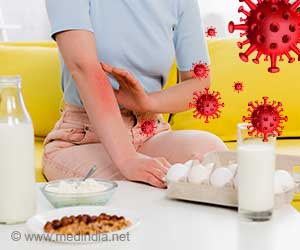- Pollen food syndrome (PFS) is a common food allergy that affects pollen-sensitized people
- Management is through the exclusion of known trigger foods, which may appear to be simple
- It can be problematic if coupled with a pre-existing food allergy or for individuals following a vegetarian/vegan diet
What is Pollen Food Syndrome?
Pollen food syndrome (PFS), also known as oral allergy syndrome, or pollen food allergy syndrome, is an increasingly prevalent food allergy that can manifest at any age. It occurs in pollen-sensitized individuals, with symptoms triggered by raw plant foods (1✔ ✔Trusted SourcePollen food allergy syndrome (PFAS): A review of current available literature
Go to source). This condition can often be managed in primary care, and this guide contains a leaflet specifically designed for use by doctors. This guideline is intended to provide evidence-based diagnostic and management advice, predominantly for birch sensitized individuals, to help stratify patients, and optimize the use of specialist allergy services.
It is intended to complement the British Society of Allergy and Clinical Immunology (BSACI) guideline on tree nut and peanut allergy, and also provide an introduction to other plant food allergies such as non-specific lipid transfer proteins (LTP).
How to Diagnose Pollen Food Syndrome?
Typically, PFS presents as reported reactions only to raw/uncooked plant foods, although some individuals may react to roasted peanut and/or tree nuts.Symptoms usually occur immediately or within 5–15 min of eating, and typically include tingling, itching, or soreness in the mouth, throat, or ears and/or mild angioedema of lips and oral mucosa.
Patients may also experience itchy hands/sneezing/eye symptoms when peeling potatoes or other root vegetables. Sometimes slight swelling of the tongue or/ pharynx, rash around the mouth and mild cough, and occasionally eye/nasal symptoms, abdominal pain, and nausea may occur (2✔ ✔Trusted Source
BSACI guideline for the diagnosis and management of pollen food syndrome in the UK
Go to source).
A diagnosis of PFS is associated with a larger skin prick test (SPT). Only those foods reported to provoke symptoms should be tested.
An oral food challenge (OFC) is rarely required for the diagnosis of PFS, except when history and diagnostic tests are inconclusive, there is a pressing need to eliminate unnecessary dietary restrictions or alleviate anxiety in the patient and their family.
How To Manage Pollen Food Syndrome?
Only the specific raw plant foods which trigger symptoms should be avoided. Antihistamines are recommended to treat symptoms in case of exposure and are generally sufficient for individuals who have mild symptoms.Everyone with a diagnosis of PFS will benefit from individual dietary counseling from a qualified dietitian, but this is imperative for those who report multiple food triggers, have a concomitant primary food allergy, or already have dietary restrictions due to religious/personal reasons.
The guideline notes that it’s essential to distinguish PFS from a primary allergy to peanuts, tree nuts, or fruit. Management focuses on avoiding known trigger foods, which may appear to be simple, but can be difficult if coupled with a pre-existing food allergy, or for individuals following a vegetarian/vegan diet.
More studies on the effect of PFS on health-related quality of life are needed to dispel the myth that because it usually manifests with mild symptoms, PFS is easily managed, and does not adversely affect the individual (3✔ ✔Trusted Source
Living with severe food allergy
Go to source).
The number of foods and concern about new food triggers means dietary restrictions are often overly strict, so more research on novel treatments of PFS, including food immunotherapy, needs to be undertaken.
References:
- Pollen food allergy syndrome (PFAS): A review of current available literature - (https://pubmed.ncbi.nlm.nih.gov/31376490/)
- BSACI guideline for the diagnosis and management of pollen food syndrome in the UK - (https://pubmed.ncbi.nlm.nih.gov/35975576/)
- Living with severe food allergy - (https://www.bps.org.uk/psychologist/living-severe-food-allergy)
Source-Medindia
















